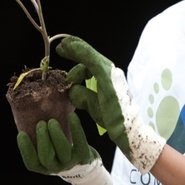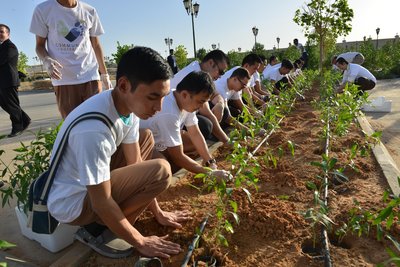 Ritz-Carlton Community Footprints
Ritz-Carlton Community Footprints
The Ritz-Carlton Hotel Company is the first founding partner of Impact 2030, a global project for corporate volunteering that will combine the joint efforts of many brands to tackle otherwise unattainable goals.
Impact 2030 hopes to marshal corporate volunteers to take part in the United Nations Sustainable Development Goals. The participation of Ritz-Carlton will likely help to expand the hotel chain’s present initiatives and will spark interest in the UN’s goals from other large corporations.
"The Ritz-Carlton is very proud to be the first Founding Partner to join IMPACT 2030," said Sue Stephenson, VP of Community Footprints at Ritz-Carlton, Chevy Chase, MD. "We believe this private sector led initiative has tremendous potential and that the activation of corporate volunteers from companies around the world will be a powerful tool to help achieve the Sustainable Development Goals."
One step at a time
The Ritz-Carlton is the first founding partner of this initiative that will begin in 2016 and run through 2030. The sustainable development goals are currently being drafted, but the hope is to settle upon 10 goals, which a minimum of 100 companies worldwide are expected to join together to accomplish.
As of press time, the goals are being drafted to eradicate hunger, poverty and inequality. They will focus on solving hunger and poverty problems, empowering women and girls, improving global health and providing adequate hygiene options for people.
Community Footprints
These goals are not just aimed at under-developed countries, but at places all over the world that experience social problems.
Businesses often recognize the impact upon consumers and employees when a brand is aligned with an initiative to make a social difference. Impact 2030 is an attempt to combine the efforts of many businesses to make a greater impact.
The Ritz-Carlton already has its own social initiative, Community Footprints. The program is Ritz-Carlton’s localized corporate social responsibility initiative that works to ensure that all Ritz-Carlton properties are beneficial to their local communities.
"Support for our communities and a commitment to the environment was written into our company’s original mission statement over 30 years ago," Ms. Stephenson said. "Community Footprints is our Ritz-Carlton social responsibility program.
"Globally, we have three focus areas; child well-being; hunger and poverty relief and environmental responsibility," she said. "These three initiatives are part of our strategic direction to our 87 Ritz-Carlton hotels and 40 Residences around the world. These properties have long-standing partnerships with non-profits and NGOs in their community. Around the world our volunteer efforts are relevant and adapted to local pressing needs."
Community Footprints
Community Footprints has led to campaigns all over the world getting Ritz-Carlton employees involved in the local communities.
For instance, Ritz-Carlton reaffirmed its role as community supporter for underprivileged children with its Succeed Through Service campaign which is being flaunted via Web site and video marketing.
The hotel brought adolescents onto its properties to mentor and highlight the benefits of education. This effort was part of the hotel’s Community Footprints social responsibility program and a follow-up to a previous initiative (see story).
On Dec. 5, Ritz-Carlton and other founding partners presented Impact 2030 at the UN.
Philanthropic actions
Forty percent of donations from ultra-high-net-worth individuals in the United States goes toward educational causes, according to a report by Wealth-X and Arton Capital.
The report notes that UHNW individuals are focusing on philanthropic initiatives that present long-term solutions to deep-seated problems, such as programs that promote entrepreneurial pursuits. Philanthropists also prefer to have measurement systems in place that can track and assess the cumulative efficacy of donations (see story).
Interest among top luxury consumers in philanthropic efforts is likely to spark charitable actions by brands looking to market to the ultra affluent consumer. As for brands involved with Impact 2030, the long-term goals may appeal to the rising affluent consumer.
"It is important to consumers that the brands they align with are making a positive impact - and for employees, millennials in particular, want to work for companies that enable them to bring their values into the workplace," Ms. Stephenson said.
"Through IMPACT 2030, the power of many will be the force that will allow us to make a positive impact on the world and inspire others to positive action," she said.
Final Take
Nancy Buckley, editorial assistant on Luxury Daily, New York


